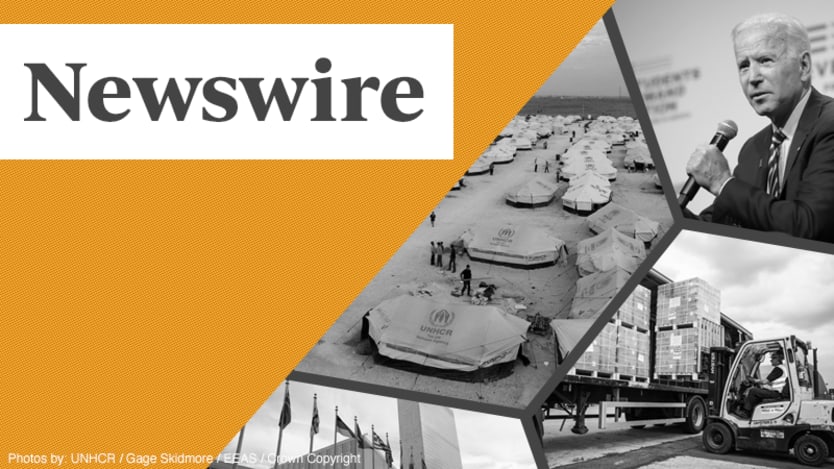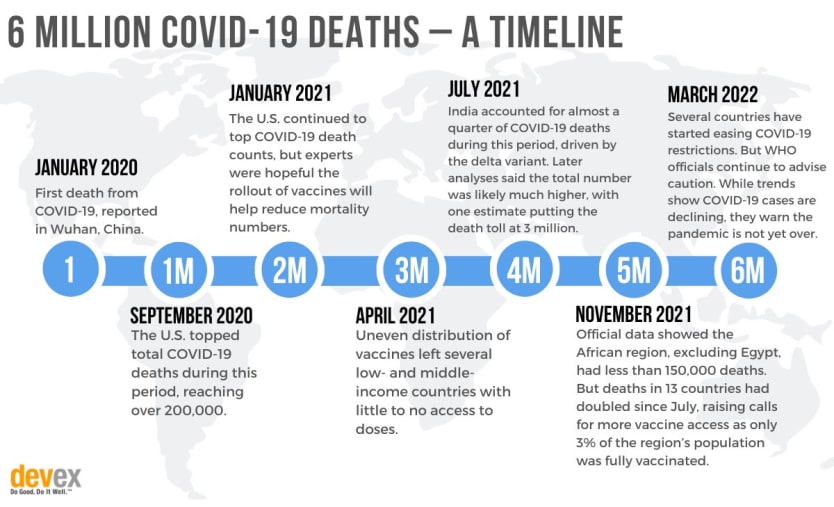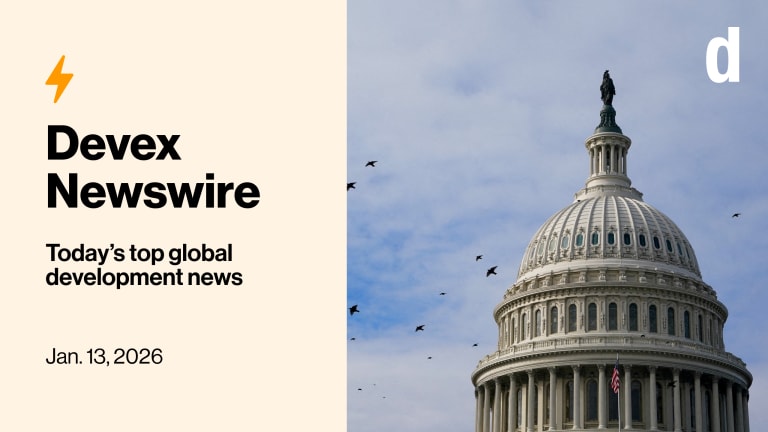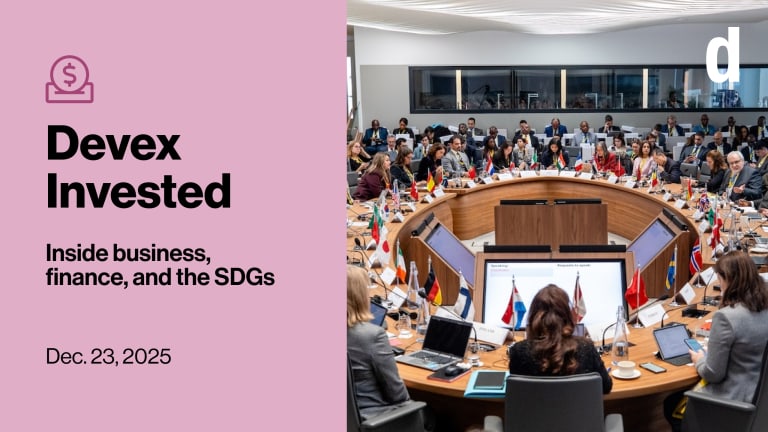
It’s a big week for Ukraine funding. The U.S. Congress, the World Bank, and the International Monetary Fund are set to consider major assistance packages for the country, while U.S. President Joe Biden’s funding proposal for the global COVID-19 response has left some experts thoroughly underwhelmed.
+ Happening this week: Join Devex President and Editor-in-Chief Raj Kumar this Thursday at 10 a.m. ET (4 p.m. CET) for a conversation with UN-Habitat Executive Director Maimunah Mohd Sharif on how the COVID-19 pandemic and climate crisis will transform our cities. Save your spot.
U.S. House Speaker Nancy Pelosi says Congress will approve the Biden administration’s request for $10 billion in emergency aid for Ukraine this week. The proposal includes $5 billion for the State Department and U.S. Agency for International Development, including $2.75 billion for humanitarian assistance and $1.75 billion for economic assistance. Of the latter total, up to $100 million could go to USAID’s Office of Transition Initiatives for “rapid” response activities such as countering disinformation and maintaining the government’s “functionality.”
In a letter to colleagues, Pelosi wrote that Congress “intends to enact” this funding as part of their big budget deal this week.
This is a preview of Newswire
Sign up to this newsletter for an inside look at the biggest stories in global development, in your inbox daily.
Also included in Biden’s emergency funding request was $4.25 billion for global COVID-19 response efforts at the State Department and USAID — nearly $2 billion of which would fund the administration’s global vaccine access initiative.
Public health advocates and a group of U.S. lawmakers have called for $17 billion in global COVID-19 funding, so the response to this request was … not great.
“This is the kind of request you’d expect from President Trump, not President Biden, who has been involved in nearly every major global health response for the past four decades. Extremely disappointing,” writes Sean Simons, communications director at Red, the Bono-founded charity.
+ Catch up on our coverage of how Russia’s invasion is affecting humanitarian work in Ukraine.
On the docket
The World Bank is upping the dollar figure of its initial proposed loan for Ukraine to $500 million, with the board due to vote on the upgraded proposal early this week.
On Friday, Ukrainian President Volodymyr Zelenskyy spoke with World Bank chief David Malpass, with the latter praising the "heroism" on display from the Ukrainians amid the Russian invasion.
The Netherlands and Sweden stepped in with additional guarantees late last week, facilitating the larger first tranche of lending, which is known as the Financing of Recovery from Economic Emergency for Ukraine — which spells out FREE Ukraine, for those keeping track. In all, the bank is aiming to get $3 billion to Ukraine.
The International Monetary Fund could also consider Ukraine’s request for $1.4 billion in emergency funding this week, says Managing Director Kristalina Georgieva.
Georgieva also warns of significant economic fallout to come from Russia’s invasion, resulting sanctions, and the growing humanitarian crisis — noting that countries with close economic ties to Ukraine and Russia are at particular risk of “scarcity and supply disruptions.”
To the bank
Here’s a bright idea: Those billions of dollars in frozen Russian assets could be used to fund a universal basic income for Ukrainians, writes former IMF chief economist Simon Johnson.
And here’s Anit Mukherjee at the Center for Global Development on whether that’s really feasible, and if it could be a template for what to do with assets frozen from Afghanistan’s central bank.
Outside the box
My colleague Stephanie Beasley speaks to IKEA Foundation CEO Per Heggenes about his strategy for chipping in to help Ukraine. The foundation recently pledged €20 million ($22 million) to help UNHCR provide aid to displaced Ukrainians, and Heggenes says the choice of partner reflects the unpredictability of the crisis.
“We have to be flexible and work with the partners that we know well and that we know can deal with making the right decisions locally,” he says.
Devex Pro: IKEA Foundation CEO on the challenges of predicting Ukraine aid needs
+ Devex Pro subscribers can also learn more about the state of humanitarian aid in Ukraine. Not gone Pro yet? Start your 15-day free trial now.
The big number

The world has recorded 6 million deaths from COVID-19. Nearly 1 million of those are from the U.S., which has recorded more COVID-19 deaths than any other country. Meanwhile, Hong Kong is experiencing a massive spike in cases, with more than 31,000 reported yesterday.
Missing ingredients
Subscribers to Devex Dish, Teresa Welsh’s must-read newsletter on all things food systems, got an early look at this report on Nestlé’s new conditional cash transfer program.
Teresa writes: “The company’s ‘income accelerator program’ will compensate farmers in the world’s primary growing regions in West Africa, which produce the company’s cocoa, for avoiding harmful actions such as child labor and deforestation by paying them cash to keep their children in school and protecting the environment around their farms. Nestlé plans to spend 1.3 billion Swiss francs ($1.4 billion) on the initiative by 2030.”
Improving the supply chain: Nestlé cash transfer scheme could boost farmer income, but will it?
+ Every Wednesday we bring you the latest news on the global food system. Sign up to Devex Dish to receive the latest edition.
In other news
The UN Refugee Agency has launched a $205 million appeal to help 1.6 million people displaced by the conflict in northern Ethiopia. [VOA]
Armed men have kidnapped two Médecins Sans Frontières workers in Yemen. [Reuters]
A fundraising campaign by a coalition of leading charities in the U.K. to assist those affected by the war in Ukraine received more than £100 million ($131.66 million) in donations. [The Guardian]
Sign up to Newswire for an inside look at the biggest stories in global development.
Search for articles
Most Read
- 1
- 2
- 3
- 4
- 5








